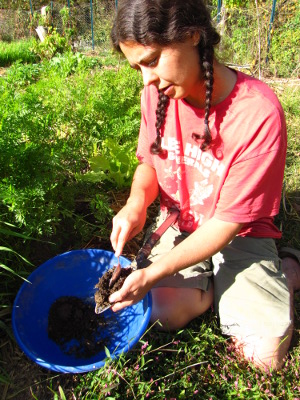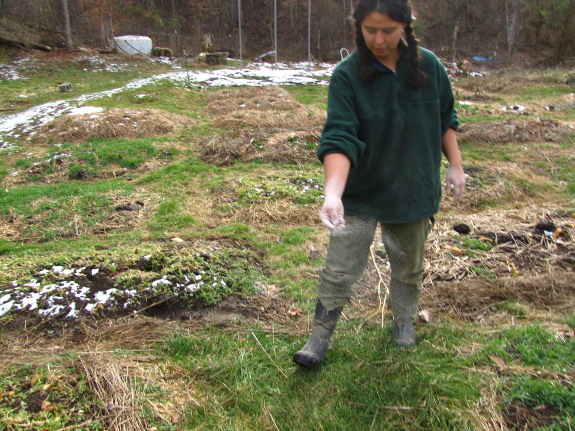
Why you might (not) choose to test your soil
 "Please explain (again)
your take on soil testing. I've never
had one done and I've gardened for many years. As your
photo
depicts, deficiencies are detectable by plant performance. I
employ crop rotation and try to compensate for particular plant
needs at or before planting and religiously compost."
"Please explain (again)
your take on soil testing. I've never
had one done and I've gardened for many years. As your
photo
depicts, deficiencies are detectable by plant performance. I
employ crop rotation and try to compensate for particular plant
needs at or before planting and religiously compost."
A lot of gardeners
test their soil and never use the information, so I know what you
mean about it not really being necessary. I generally only
send a soil sample off to be tested if I have a reason to.
Specific testing purposes might include (from most to least
important for me):
You
want to plant blueberries or something similar in average soil. If you're going
to need to change the pH of your soil, it's good to have an idea
of how acid or alkaline your soil is at the moment.
You
want to get an idea of how you're improving (or worsening) your
soil over time. I like to look at the percent organic matter and CEC of my soil because these
figures are (hopefully) going up every year. This is
generally just interesting, but can be important in permanent
perennial systems (like pastures) where you never really see the
dirt, so you can't just guess based on on color and texture.
You
plan to remineralize
your soil.
If you believe that ratios of nutrients are just as important as
the absolute amounts (which I'm on the fence about), you'll need
more solid data before you can add minerals to your soil.
 You're concerned there may
be a slight deficiency that isn't showing up in your plants. Most soils are
lacking in something (related to the remineralization concept
above). Your plants might just slow down a bit due to a mild
deficiency, but if you're getting most or all of your nutrition
from homegrown food, then a mild deficiency in your plants could
turn into a mild to moderate deficiency in yourself. You
might not care much if your plants are only operating at 80%
efficiency, but I'll bet you care if your kids are.
You're concerned there may
be a slight deficiency that isn't showing up in your plants. Most soils are
lacking in something (related to the remineralization concept
above). Your plants might just slow down a bit due to a mild
deficiency, but if you're getting most or all of your nutrition
from homegrown food, then a mild deficiency in your plants could
turn into a mild to moderate deficiency in yourself. You
might not care much if your plants are only operating at 80%
efficiency, but I'll bet you care if your kids are.
You
think your soil might contain heavy
metals.
A one-time soil test is probably worth doing if you live in a city
or have some other reason to believe your soil might have heavy
metals present above the recommended levels.
You
see some kind of nutrient deficiency in your plants, but can't
figure out what it is. Even though you can tell some problems apart
visually, others look pretty similar. If you're a
large-scale farmer, you might even choose to take a plant tissue
sample in this situation instead of a soil sample.
You
are a chemical farmer. If you're buying any kind of chemical fertilizer,
you should definitely get your soil tested first and see how much
of it you need. On the other hand, if you fertilize with
compost, this isn't so important.
There are probably
other reasons you'd want to test your soil, but those are the
first ones that come to mind. What would you add to the
list?
Want more in-depth information? Browse through our books.
Or explore more posts by date or by subject.
About us: Anna Hess and Mark Hamilton spent over a decade living self-sufficiently in the mountains of Virginia before moving north to start over from scratch in the foothills of Ohio. They've experimented with permaculture, no-till gardening, trailersteading, home-based microbusinesses and much more, writing about their adventures in both blogs and books.
Want to be notified when new comments are posted on this page? Click on the RSS button after you add a comment to subscribe to the comment feed, or simply check the box beside "email replies to me" while writing your comment.

Hi Anna,
I was wondering if you could clarify your comment about being on the fence about ratios vs. absolute quantities. Based on your earlier mineralization posts, I'm supposing that you're on board with balancing ratios and on the fence about the absolute quantities. Frankly, I love testing my garden soils, but I'm an environmental scientist and a data nerd I tried Solomon's remineralization techniques this year but didn't notice any stellar gains in plant performance. My TCEC is rather low (5-6) so I'm applying bentonite clay and biochar to help boost nutrient retention. I'll give it a few more years. To me, the soil test is a crucial step towards establishing healthy, balanced soils.
I tried Solomon's remineralization techniques this year but didn't notice any stellar gains in plant performance. My TCEC is rather low (5-6) so I'm applying bentonite clay and biochar to help boost nutrient retention. I'll give it a few more years. To me, the soil test is a crucial step towards establishing healthy, balanced soils.
Hi Anna and all,
Good question.
Probably the most convincing observation for me was:
Detailed soil testing near Concord, NH (Logan Labs Agrodyne III) shows 3 trace minerals that are very low. ( I don't off had remember which.)
Hair trace mineral testing of both my wife and myself shows we are deficient in those same 3 minerals!!! Yikes !!!!!
As you suggest actually getting those into your soil and plants can be non-trivial.
And plant and animal (yourself) testing is the only way to know that you have probably changed things and hopefully this is an improvement?
I find granite dust and real seaweed and seawater work pretty well. By real seaweed I mean going to the ocean and collecting it yourself. NOT buying a bottle of who knows what and pretending that will do the job.
Anna and Mark. Always nice to read your writings!!!
John
Especially for those who live in an urban area;
I enjoyed everyone's thoughtful comments on this post! I'll be answering Mike in a separate post in a day or two.
Patsy --- We're in zone 6, but my mother gardens in zone 7, so I'm pretty familiar with it. Hopefully you've already been trying southern highbush and/or rabbiteye blueberries instead of northern highbush? And focusing on acidifying the soil?
Grapes seem to be tricky to grow organically --- I'm still working on that. And I can't tell you for sure about plums, although our new European plums seem to be doing drastically better than the Asian plum did.